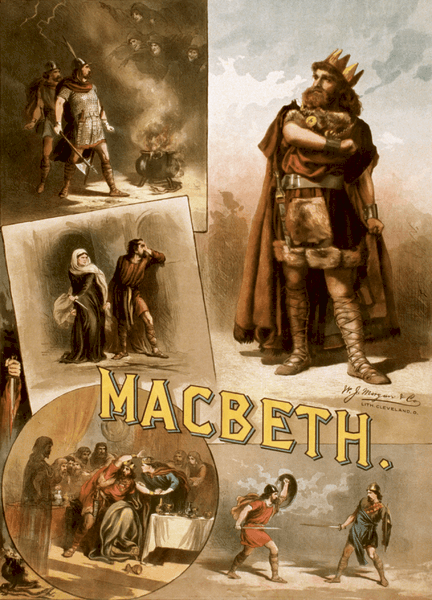Lady Macbeth is widely regarded as one of the most villainous female characters in all of English literature, and perhaps Shakespeare’s most cold-hearted female character. Not only does she urge her husband to murder their King for no other reason than heartless ambition, she also states that she would dash out her own baby’s brains rather than lose her courage for such a regicidal act.
Yet to an extent, she is villainous more out of what she says than what she does. She doesn’t personally kill anyone in the play, although a modern court of law would still come down heavily on her for inciting her husband to do the deed and acting as his accomplice. And although she says she would kill her own baby, she is trying to outdo her husband in ruthlessness here, and spur him to ‘man up’, as she sees it.  It’s noteworthy that, when she is on her own just before Macbeth returns with bloody hands (having done the deed), she confesses that she would have carried out the murder herself, but Duncan reminded her of her father as he slept. Whether we interpret this as a fear of reprisal (she reverts to being the dutiful daughter terrified of being punished by her father for an evil deed) or a rare moment of humanity (she remembers for a moment what a hideous and cruel idea it is to murder a man while he sleeps), it shows her as something less than the cold-hearted and ruthless murderess (or abettor to murder, anyway) that she otherwise comes across as.
It’s noteworthy that, when she is on her own just before Macbeth returns with bloody hands (having done the deed), she confesses that she would have carried out the murder herself, but Duncan reminded her of her father as he slept. Whether we interpret this as a fear of reprisal (she reverts to being the dutiful daughter terrified of being punished by her father for an evil deed) or a rare moment of humanity (she remembers for a moment what a hideous and cruel idea it is to murder a man while he sleeps), it shows her as something less than the cold-hearted and ruthless murderess (or abettor to murder, anyway) that she otherwise comes across as.
‘How many children had Lady Macbeth?’ was the title of a long essay by the critic L. C. Knights, published in 1933, mocking the school of criticism (ultimately influenced by the critic A. C. Bradley) which seeks to ask, and answer, such questions about details hinted at, but not confirmed, in the play concerning characters’ lives. Although the play doesn’t tell us, Lady Macbeth does declare that she has ‘given suck’ to a baby, although whether this was her child with Macbeth, or a child by a previous marriage (in keeping with the source material in Holinshed), the play never reveals.
Does the question matter? In one sense, no. Even if Macbeth has no heir to succeed him (so the crown might end up passing to Banquo’s descendants anyway), he may hope to get one. So the motivation for keeping the crown and getting rid of Banquo and Fleance remains the same. The most important thing, perhaps, is Lady Macbeth’s shocking revelation that she would be prepared to murder her own baby that she had suckled (whether her child with Macbeth or not is beside the point) in order to fulfil her ambition for power.


For me, Lady Macbeth is the ultimate supportive spouse: ready to do everything it takes to help her husband to achieve his ultimate goal, no matter if this will cause her madness first, and then her death. Macbeth is quite the ungrateful sod: when he is told about his queen’s death, he simply shrugs. Poor Gruoch (the real Lady Macbeth’s name), what kind of fame was she undeservedly given.
The worst take I have heard
Very much interesting..